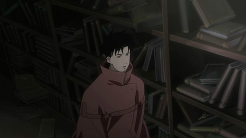
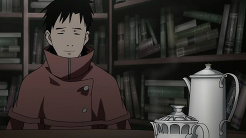
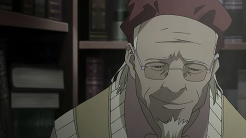
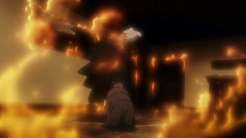
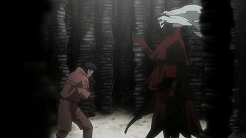
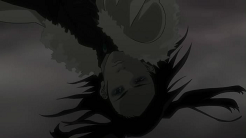
Ergo Proxy = Love. Seriously, my last post about .Hack//Roots really made me think about clever anime, what they are, and what they look like. This episode was so utterly incredible that it gave me such a new insight on this matter. Most people will probably dislike this episode, as it just features Vincent talking to himself for twenty whole minutes. But I totally loved it. So many references were made, so many metaphors were used, and the dialogue was just totally incredible. This episode truly can not be summarized, and I won’t even attempt to do that. So many small things mattered.
First of all, what does define a clever anime? I’d like to think of an anime which really makes me think. And not just a bit, as in a small note which comes to my mind, but an anime who manages to send all kinds of thoughts rambling through my head, like there’s nothing to stop them, something like a fierce mountain river which lasts for kilometres and kilometres. .Hack//Sign was the first example of this. Right now, the only anime I’m watching who accomplishes the same tasks is Ergo Proxy, with Higurashi no Naku Koro no and Mushishi getting very close as a second and third. Higurashi features very carefully written plot and mystery, while Ergo Proxy’s dialogue manages to hit me time and time again and Mushishi’s themes also make you think about the issues they introduce. Apart from these four mentioned, the only other near-clever anime I managed to run into were Fantastic Children, Utena and Fruits Basket, with xxxHolic having very small potential of becoming one. Fantastic Children had its great theme of reincarnation, Utena had its great use of symbols, while Fruits Basket delved deep into the minds of each of the characters.
Each of these anime are extremely well written, and each of them is written in its own way. It’s not just the themes, it’s how the creators make use of it. I’ve also noticed that most of them make good use of phylosophy. Especially Ergo Proxy and .Hack//Sign, and I must admit, I am a sucker for anything phylosophy-related. But still, the fact that phylosophy is used, means that there isn’t just one right answer, and one wrong answer. So many different opinions are possible, and each of them bears some hidden truth.
Anyway, back to the episode, I just loved it. Remember the sentence Raoul said in the previous episode? (I think, therefore I …, leaving the last word open on purpose). This sentence comes back, though slightly altered. It’s not “I think therefore I am”, it’s “I think, therefore YOU are”. Basically, humans are able to create their own world. They do exist, and they make others exist, inside their world. It’s also interesting that Vincent ends up in a bookstore. In there, he finds all kinds of books, and all of them have his name written on their cover. When he looks at the pages, they’re empty. At the beginning of the episode, the books keep increasing. Then Vincent comes at a point at which he begins to recite his own memories, of the things he knows. This makes some of the books disappear. At the end of the episode, Pino ends up at the Usagi again, and even there lies one of these books. Though this time, the books don’t vanish, they only lose their inscription of Vincent on their cover. This probably means that Vincent finally found himself, and accepted the fact that he IS a Proxy. (Interesting note: along with Vincent’s name, this book also featured a butterfly on its cover. This butterfly also vanished along with the name. Would that mean anything?).
Another interesting fact is that there’s the same discussion being held, twice. Once at the beginning of the episode, and once at the ending of the episode. Each of them have different outcomes, showing Vincent what he learned. Vincent lost his way at the beginning of the episode, and decided to go to the bookstore in order to ask for directions. Meanwhile, a fog started coming up, and he lost Pino. He wanted to know all these things at once. At the end of the episode, he finally realizes this. And the bookstore. For some reason, Vincent’s head turned this into a gigantic maze, but for some other reason, the maze formed a perfect circle, with Vincent in the middle. This points at the struggles that Vincent is currently in. Brilliantly found.
This episode certianly played with the minds of the viewers, as we don’t exactly know what happened in Vincent’s head, and what didn’t. For starters: was the bookstore even real, or was this a figment of Vincent’s imagination as well? Everything looked realistic and all, except for the fact that there’s a bookstore in the middle of nowhere. When Pino was walking in the Usagi, you could see one of the books bearing Vincent’s name. Was that because of Vincent’s power as a Proxy? And still, in the end, Vincent did end up getting directions. Is that really something that can form inside your head? What about the fact that at one point, Ergo and the old man were arguing with each other? Can things like these really happen, even inside your head? And if the old man did exist in reality, what part of him was real, and what part wasn’t? After all, he was the only one who didn’t end up with an Ergo Proxy mask. Ergo Proxy uses this opportunity to talk to Vincent, but the two of them indeed seemed to not have the same opinion. In fact, Ergo was just trying to make clear to Vincent that he was is a Proxy, and that the two of them are the same. But does the fact that they share the same body, mean that the two of them are also the same? I mean, Vincent is Vincent, and when Vincent loses control, Vincent blacks out and Ergo appears.
It’s also interesting that Vincent takes a trip along his memories of the past, with each person appearing with an Ergo Proxy-mask (this was, by the way, a scary sight on Pino and other little children). Ergo comes with a nice statement. At the moment, he’s only observing the world, while not being any part of it. Is that what Proxy are able to do? Messengers sent from a higher level? It’s also interesting that near the end of the episode, Real gets to be the one who loses her mask. She disappears afterwards, of course, but then, Ergo sets the mask on fire, while asking Vincent which Proxy he is. I guess he wanted to see how Vincent reacted when the Ergo-mask was to be destroyed. It’s interesting to see Vincent clinging to that mask at such a cornered moment. Afterwards, Vincent becomes surrounded by mirrors, in Ergo-mode, only strenthening this effect.
Okay, I hope that that was understandable… Anyway, overall, this episode was just totally incredible. It SO messes with the viewer’s mind. At least, it did with mine. The Ergo inside Vincent is planning something, but before he does that, he needs Vincent to realize that the two of them are the same. The episode ends with Real catching up with Vincent. You’d wonder how she managed to find him. After all, Vincent was lost. How do you find someone who’s lost? I guess she’s special after all. But in what way?
On a side-note: What is the memory guardian? Could it be the thing that prevents Vincent from remembering what he does as Ergo? And why was the old man against unlocking it?
On a side-note2: I’ve recently managed to get my hands on the Ergo Proxy OST, and it’s amazing. I really recommend it.

I think the ergo and the guardian are directly taken from Freud’s works,the guardian represent Vincent “superego” and the Ego represent in this episode vincent’s “it”.
In fact Ego and Vincent could also represent duality between the soul and the body from Descartes philosophy…
Or maybe I’m just going to deeply,in fact what I hate is that they use a lot of philosophic references as “answers” for Vincent identity quest,when they cited Rousseau I think I was about to blow the screen…They’re using philosophy not as a question but as way,sorry I’m not good at expressing myself on these subjects in English.
Let’s just say that it looks like they reinterpret various quote totaly out of there original context,wich would make any neophyte have a bad conception of french philosophy.
In a word it’s an anime that makes you think that you have much too think on it,but shamefully it’s just a rather classic scenario devlopped in a way that seems very elitist.
On an other end,if you are just watching it for fun,this episode was incredibly good.
On a side not if you really like clever anime try Evangelion(freudism),Jin Roh(moral),everything Ghibli(many themes but mostly ecology),Cowboy Bebop(especially the movie) and Martian Succesor Nadescico The Movie(even if it seems stupid at first,it’s a lot more intelligent than everyone thinks)..These are all I can directly think of,if another comes to my mind I’ll tell you later.
By the way sorry for double posting,and enjoy Higurashi 9.
I think I understand what you’re trying to say. That’s indeed another way to see it. Still, you can also say that this anime is making its own version of these quotes. It’s kindof like historical anime, in a way. Still, I’m indeed ashamed to say that I remain a neophyte at this subject. I’ve gotten a bit phylosophy lessons, barely enough to see the whole picture a bit. You can indeed say that I got a bit giddly when I was able to recognize these quotes.
Oh, and no problem concerning the double-posts, and thanks for the recommendations. ^_^
No,I’m not saying you’ve got giddly or anything,it’s just that I’m doing philosophy studies and i don’t really like this idea of using philosophy to sell;even if they managed to do it quite well in this anime particulary.(I remember how they destroyed the last episode of Gankutsou,I hope it wont have the same fate).
By the way for philosophical anime I forgot the ultimate reference:all movies by Oshii.
Ah, yes. Sorry for the misunderstanding. A phylosophy student indeed has very different views on this subject than a person who followed the subject for one measly year in high-school. ^^;